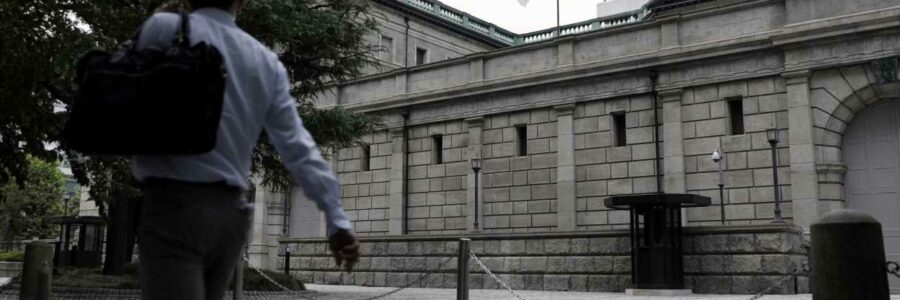
Bank of Japan holds steady on policy, offers bleaker view on exports, output
- The Bank of Japan (BOJ) kept monetary policy steady on Wednesday but offered a bleaker view on exports and output, reinforcing expectations the bank will maintain its massive stimulus even as major counterparts eye a withdrawal of crisis-mode support.
- The gloom hanging over manufacturers, hit by Asian factory shutdowns caused by the coronavirus pandemic, adds to woes for Japan's fragile recovery, which has been hobbled by weak consumption.
- The BOJ maintained its assessment on the economy, saying it was "picking up as a trend, although remaining in a severe state due to the impact of the pandemic."
The Bank of Japan kept monetary policy steady on Wednesday but offered a bleaker view on exports
and output, reinforcing expectations the bank will maintain its massive stimulus even as major counterparts eye a withdrawal of crisis-mode support.
The gloom hanging over manufacturers, hit by Asian factory shutdowns caused by the coronavirus pandemic, adds to woes for Japan's fragile recovery, which has been hobbled by weak consumption.
"Exports and factory output continue to increase, although they are partly affected by supply constraints," the central bank said in a statement announcing the decision. That was a gloomier view than in July, when it said exports and output "continued to increase steadily."
The BOJ maintained its assessment on the economy, saying it was "picking up as a trend, although remaining in a severe state due to the impact of the pandemic."
As widely expected, the BOJ maintained its short-term interest rate target at -0.1% and that for 10-year bond yields around 0%.
"The BOJ probably thinks the supply-chain disruption and global chip shortages will be resolved sooner or later. But there's new risks emerging from China's slowdown," said Naomi Muguruma, senior market economist at Mitsubishi UFJ Morgan Stanley Securities.
"The downgrade in exports and output may be a prelude to a cut in the BOJ's overall economic assessment," she said.
The rate review came ahead of a ruling party leadership race on Sept. 29 that may shift the administration's focus away from the current stance based on former premier Shinzo Abe's "Abenomics" reflationist policies, analysts say.
While the candidates agree on the need to maintain massive monetary support for now, they vary on the preferred long-term policy path, an area Governor Haruhiko Kuroda may be grilled on at his post-meeting briefing.
Japan's economy emerged from last year's doldrums, as robust global demand partly offset the hit to consumption from extended state of emergency curbs to combat the pandemic.
But supply constraints, mainly for chips and parts produced in Southeast Asia, have forced some Japanese firms to slash output, raising concerns among policymakers that Japan's recovery could be delayed.
Weak inflation has also reinforced expectations the BOJ will lag other major central banks in dialing back stimulus. Core consumer prices fell 0.2% in July from a year earlier to mark the 12th straight month of declines, as weak consumption discouraged firms from passing on rising raw material costs to
households.
Source: Read Full Article